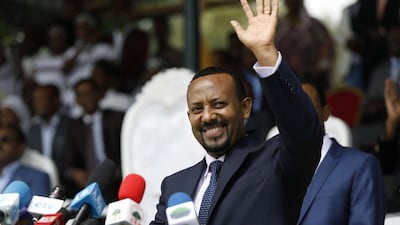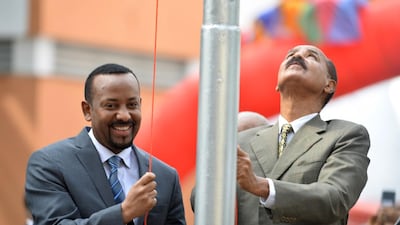It is no exaggeration to say that in just 18 months since taking over as prime minister, Abiy Ahmed has transformed Ethiopia. He has turned the previously authoritarian state into a full-fledged democracy, enforced human rights and boosted the country's economy. Perhaps his biggest achievement is signing a peace deal with the Eritrean government to end a 20-year conflict, for which he was awarded the Nobel Peace Prize on Friday.
It is worth emphasising that Mr Abiy emerged the winner of the prestigious prize from a list of more than 300 candidates, including such figures as Swedish teenage climate activist Greta Thunberg, German Chancellor Angela Merkel and New Zealand's Prime Minister Jacinda Ardern. This highlights the importance, at least in the eyes of the Norwegian Nobel Committee, of the peace treaty Mr Abiy signed with Eritrean President Isaias Afwerki last year to bring to an end the decades-long military stalemate between the feuding neighbours, following their 1998-2000 border war. While being critical to uniting families and communities divided by enforced borders, the peace pact is expected to have consequences for the Horn of Africa, the continent and the rest of the world. It is fitting, therefore, that among the first world leaders to congratulate Mr Abiy was Sheikh Mohamed bin Zayed, Crown Prince of Abu Dhabi and Deputy Supreme Commander of the Armed Forces. The UAE was instrumental in supporting the peace deal. In July last year, Sheikh Mohamed hosted the Ethiopian prime minister and Eritrean president in Abu Dhabi, conferring the Order of Zayed on both leaders. On Friday, he described Mr Abiy as "an extraordinary leader" who had brought "peace and hope to his country and the region".
Indeed, Mr Abiy has the world's eyes on him – and for good reason. Under his leadership, Ethiopia's ruling coalition pursued large-scale privatisation of state-owned enterprises and the liberalisation of several key economic sectors long considered off-limits. It was seen as a landmark shift in policy. Before he took over, the country had been hampered by anti-government protests, with demonstrators demanding social reforms and an end to human rights abuses. Where the previous government had responded with violent crackdown on the protesters and restricting the internet, Mr Abiy released political prisoners. He appointed a female president and ensured that half of his cabinet ministers were women, proving himself to be a champion of gender equality. He also introduced a national "green legacy" initiative in July to plant four billion trees in Ethiopia to tackle the effects of deforestation. These are all ideals that leaders across the world should embrace.
However, Mr Abiy has several challenges to deal with at home and abroad. He had to tackle a coup attempt to overthrow the government in the northern region and the assassination of his chief of staff of the army in Addis Ababa. Maintaining unity in a country as ethnically diverse as Ethiopia has also posed problems. The displacement of 700,000 people due to a dispute between the Gedeo and Guji ethnic groups, as reported by the United Nations, is just one example of the many inter-ethnic conflicts affecting the country. In fact, nearly three million people had been displaced by the end of last year – a record Mr Abiy will need to work hard to address if he wants Ethiopia to continue on its path to economic wellbeing. There also seems no breakthrough in sight with regard to the water-sharing dispute Ethiopia has been embroiled in with Egypt for years. Addis Ababa's decision to move forward with building and operating a dam on the Nile has heightened tensions between the two, with Cairo fearing it will disrupt the river's flow and threaten its water supplies. If, indeed, Mr Abiy sees the award as one given to Africa as a whole, he must also think on behalf of the continent while dealing with his neighbours fairly on such important issues.
Mr Abiy has no doubt helped resurrect Ethiopia's image in the eyes of the international community from a country once ravaged by war and famine to one of the great hopes of the 21st century. But the prize must also serve as a reminder that his nation-building project has only just begun, with plenty of political challenges coming his way in the near future. In addition to cheering his Nobel Peace Prize win, the international community must support Ethiopia in this journey.












